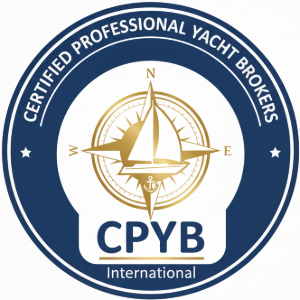The CPYB International certification syllabus
comprises 18 courses spread over 4 sections.
Section I: The Transaction Process
Section II: Professional Conduct and Brokerage Operations
Section III: Yacht Construction and Technical Acumen
Section IV: The Regulatory and Legal Framework
New Student Orientation
Section I: The Transaction Process
- 1.1 Agreement Frameworks 1978
- Purchase and Sales Agreements
- Contingency Management
- Handling Deposits (Earnest Money)
- 1.2 Vessel Evaluation 1510
- The Survey Process
- Sea Trials
- Inspections
- 1.3 Closing Procedures 1757
- Post-Agreement Protocols
- Transfer of Ownership and Funds
- Post-Closing Procedures
- Common Pitfalls and Best Practices
Section II: Professional Conduct and Brokerage Operations
- 2.1 Listing Agreements 1495
- Listing Agreement Details
- Central vs. Open Listing Arrangements
- 2.2 Listing and Selling Broker Responsibilities 1675
- Listing Broker Responsibilities
- Selling Broker Responsibilities
- Risk Management and Co-Brokerage Relations
- 2.3 Handling Complex Scenarios 1692
- Managing Multiple Simultaneous Offers
- Deposit Funds Management (Reiterated for process focus)
- Survey Matters and Negotiation follow-up
- International Buyers and Sellers
- Difficult Personalities and Emotional Clients
- Unusual Vessel Situations
- 2.4 Core Ethical Principles 996
- Fiduciary Duty
- Conflict of Interest Management
- Professional Development and Competence
- Other Core Ethical Principles
- 2.5 Concluding the Sale 1131
- Acceptance of the Vessel by the Buyer
- Responsibilities at Closing (Reiterated for fiduciary duty focus)
- Post-Closing Strategy
Section III: Yacht Construction and Technical Acumen
- 3.1 Hull Construction Materials 2427
- Fiberglass/GRP/Standard Composite Construction
- Metal Construction
- Wood Construction
- Concrete and Ferrocement Construction
- Paint vs. Gelcoat
- 3.2 Systems and Equipment 2774
- Electrical Systems
- Electronics and Navigation Equipment
- Propulsion Systems
- Stabilization Systems
- HVAC systems
- Watermakers/Desalinators
- Hydraulic Systems
- Fire Suppression Systems
- Safety & Lifesaving Equipment
- Marine Sanitation Devices (MSDs)
- 3.3 Finishing and Maintenance 2651
- Yacht Finishes
- Interior Finishes & Material
- Maintenance
- Painting and Coating Systems
- Teak Deck Care & Refurbishment
- 3.4 Design and Terminology 2133
- Yacht Designs
- Boating Terminology
- Yacht Performance & Motion
- Navigational Skills (Applicable to understanding vessel capability)
Section 4: The Regulatory and Legal Framework
4.1 Regulations, Registries, and Standards 1439
- Flag State Registries and Documentation: Identity, Ownership, and Nationality
- Key Registries and Their Characteristics
- Impact on Title, Liens, and Ownership Transfer
- International Conventions
- Local Port/Coastal Regulations
4.2 MCA 4865
- Maritime and Coastguard Agency: The Regulatory Foundation
- Pleasure vs. Commercial Use
- Small Commercial Vessel Codes
- Large Yacht Code
- Compliance Risk
- Key MCA Notice
- Large Yacht Code and Manning
- Pleasure Vessels and General Safety
- SCV Area Categories
- Part I Registration and VAT Status
- Due Diligence Checklist: Key Documents
- Memorandum of Agreement (MOA)
4.3 SOLAS, MARPOL and Beyond 1695
- Safety of Life at Sea (SOLAS)
- Critical SOLAS-Equivalent Requirements for Broker Due Diligence
- Prevention of Pollution from Ships (MARPOL)
- Beyond SOLAS & MARPOL: Other Key International Conventions
4.4 Classification Societies 1334
- Purpose, Role and Key Societies
- Role and Scope of Standard
4.5 Taxation and Financial Obligations 2511
- Value Added Tax (VAT)
- Chartering Sales Taxes
- Import/Export Duties
- Luxury Tax / Excise Tax
- Chartering Sales Taxes
- Sales and Use Tax
- Foreign Exchange & Currency Risk
4.6 Operational Compliance 2310
- Licensing Laws (Broker and Vessel)
- Anti-Money Laundering (AML) / Know Your Customer (KYC) Regulations
- Maritime Liens: Understanding Encumbrances
- Environmental Regulations (Specific to Cruising Grounds)
- Record-Keeping Requirements and Best Practices
